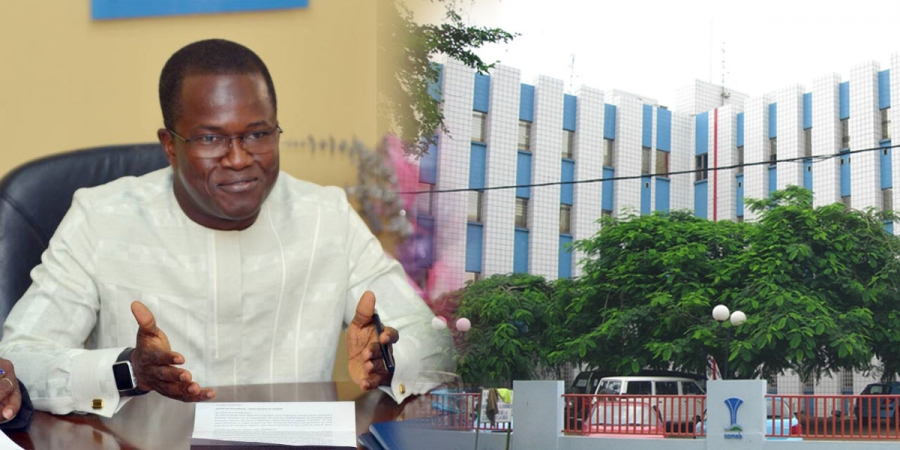Mr. Camille DANSOU, you are the Managing Director of SONEB, the Benin National Water Utility, could you please introduce us SONEB?
The Benin National Water Utility (SONEB) was born from the institutional reform that took place in 2003, which resulted in the separation of water and electricity activities from the former Beninese Electricity and Water Company (SBEE). SONEB started its activities in January 2004 under the supervision of the Ministry of Water, with the mission to provide drinking water supply and wastewater disposal services to the people of Benin in urban and peri-urban areas nationwide.
In line with the stated ambition of the Head of State, President Patrice TALON, to reach the universal access of all Beninese to drinking water by 2021, the Government of Benin has engaged since several months now in an institutional reform process to implement SONEB. This aims to position the company as a modern, efficient utility capable of responding in a sustainable and efficient manner to the aspirations of the Beninese people for drinking water and sanitation in urban areas and peri-urban.
To this end, with the political will supported by the Government of President Patrice TALON, several MAJOR drinking water supply projects have been initiated in all departments of the country, in part to modernize the existing facilities of SONEB and on the other hand, to secure the continuous supply of drinking water.
The Government of the Republic of Benin has decided to provide universal access to drinking water for all Beninese people by 2021, which is ten years before the deadline set by the UN for the realization of SDGs. How does SONEB intend to succeed in this ambitious program?
The Sustainable Development Goals (SDGs) remain the international benchmark for all our countries. But you agree with me that access to drinking water is both a priority and urgent need that our respective populations formulate almost daily in their grievances to our authorities. The Benin Government has made these SDGs the principle of “leaving no one behind”, a fundamental basis for the design and implementation of its public policies. Recognizing this urgent vital need and Benin’s inalienable right to drinking water, the President Patrice Talon made this strong and salutary commitment to offer by 2021, universal access to drinking water for the Beninese populations living both in urban and rural areas; ten years before the deadline set by the United Nations.
To reach this goal, as far as SONEB is concerned, the Government has very quickly undertaken structuring infrastructure projects on various types of financing, mainly following a PPP approach (Public-Private Partnership).
In parallel with the implementation of infrastructure and with the view to better management and sustainable use of water services, the government has embarked on a reform that will lead in the next few months to breaking-up the current Benin National Water Utility (SONEB) in two entities respectively (i) public heritage and (ii) contracting a private operator for managing them. These reforms will also be accompanied by a regulatory body and a financial model to ensure the sustainability of drinking water services to Beninese.
SONEB, which I am in charge of, firmly strives to this effect, not only to improve its performance, but above all for the success of these two priority levers of the government. (...)
What do you think of AfWA and what are the challenges of water and sanitation in Africa?
The main challenges related to drinking water and sanitation in our countries in Africa are almost similar. These are mainly resources and funding mobilizing to sustainably meet the ever-increasing needs of our populations. In the short term, the goal is to stepping up the achievement of the Sustainable Development Goals (SDGs), including universal access to drinking water and sanitation services. We have so far focused mainly on infrastructure development, and we know how to do it. But the challenge remains to ensure a quality of flawless and uninterrupted services to our people. To this end, our association, AfWA whose continental and international reputation is well established, is a melting pot of experiences and skills exchange, benchmarking and building on lessons learned, which are highly useful for each of our countries. This wealth of knowledge and experience in all relevant themes of water and sanitation is a formidable source of relevant tools and reflections that can help us meet the challenges we are facing. For my part, following my first participation in the sessions of the Scientific and Technical Committee (STC) and the Executive Board (EB) of AfWA in Kampala, I can assure you that I have, on this occasion, noted the interest, dynamism and commitment of all at the service of drinking water. This is a satisfactory point that reassures with respect to Africa’s capacity to win the challenge of the SDGs and access to drinking water for all.

 English
English  Français
Français 
